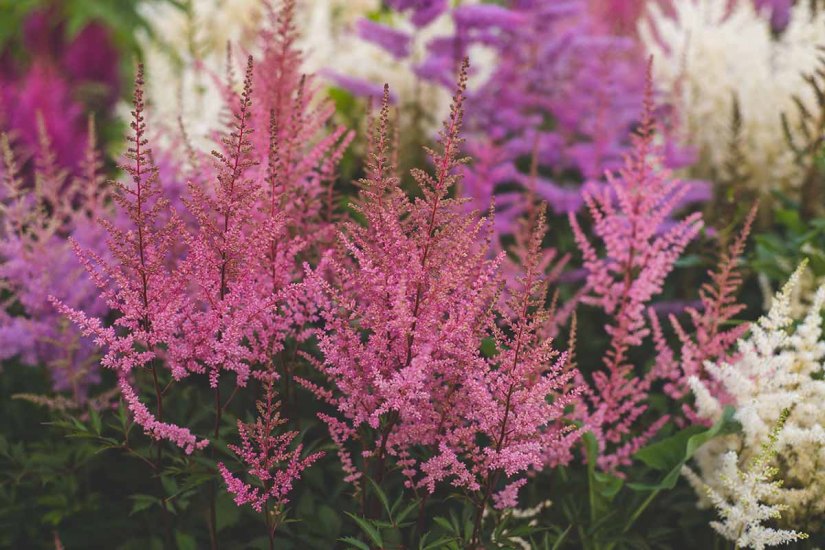Astilbe is a perennial plant that captivates garden enthusiasts with its stunning blooms and elegant foliage. Choosing the right astilbe varieties is essential in creating a beautiful and enchanting garden.
In this article, we will guide you through various available astilbe varieties, providing detailed information about their characteristics and growth requirements.
With this knowledge, you will be able to select astilbe varieties that suit your garden and create an extraordinary landscape.
Contents
Getting to Know Astilbe

As a perennial plant, astilbe is a popular choice for gardens due to its beautiful flowers and attractive leaf shapes. It thrives in partially shaded to shaded areas and prefers moist but not waterlogged soil. Some astilbe varieties can tolerate slightly open areas or warmer conditions.
Varieties of Astilbe
Japanese Astilbe (Astilbe japonica)

Japanese Astilbe features beautiful pink flowers and dense, dark green foliage. It is a shorter variety, suitable for potting or small garden beds.
Japanese Astilbe thrives in morning sun or partial shade and requires consistently moist soil. It complements contemporary or Japanese-style gardens with its refined appearance.
Hektor Astilbe (Astilbe x arendsii ‘Hektor’)

Hektor Astilbe stands tall at 60 cm and boasts vibrant red flowers. This variety grows well in shaded areas with rich, moist soil. Hektor Astilbe is often used as a focal point in cottage-style gardens or colorful landscapes.
Younique Astilbe (Astilbe Younique Series)

The Younique series offers outstanding varieties with a range of flower colors, including red, pink, and white. Younique Astilbe thrives in moist and moderately sunny conditions. They are popular choices for formal gardens or elegant modern landscapes.
Washington Astilbe (Astilbe x arendsii ‘Washington’)

Washington Astilbe presents elegant white blooms on sturdy stems. This variety thrives in slightly more open areas and can withstand full morning sun with sufficient water.
Washington Astilbe complements contemporary gardens or informal landscapes with a natural touch.
Bridal Veil Astilbe (Astilbe simplicifolia ‘Hennie Graafland’)

Bridal Veil Astilbe exhibits pure white flowers resembling elegant bridal veils. This compact variety is ideal for small spaces or rock gardens. Bridal Veil Astilbe can be grown in areas with morning sun or partial shade.
Choosing the Right Astilbe Varieties for You

Select astilbe varieties based on your soil type and garden conditions. For shaded gardens, consider Japanese Astilbe or Hektor Astilbe. If you desire a variety of flower colors, the Younique series offers attractive choices.
Don’t forget to mix and match several astilbe varieties to create a diverse and visually appealing garden.
General Care Tips

Astilbe requires proper care to thrive. Ensure the soil remains moist and avoid prolonged dry conditions. Regular fertilization ensures healthy growth and abundant blooms. Additionally, regular pruning maintains a tidy appearance and prevents overgrowth.
Garden Design Inspiration with Astilbe

Astilbe is a versatile plant that complements various garden styles. You can use it as a focal point in formal gardens or create a natural look in cottage-style landscapes. Combine astilbe with other plants to craft captivating compositions in your garden.
Conclusion
Astilbe is a stunning perennial plant that deserves a place in your garden. By selecting the right varieties based on their characteristics and growth requirements, you can create a beautiful and enchanting landscape.
Feel free to experiment with different astilbe varieties to match your style and preferences. Happy gardening!
